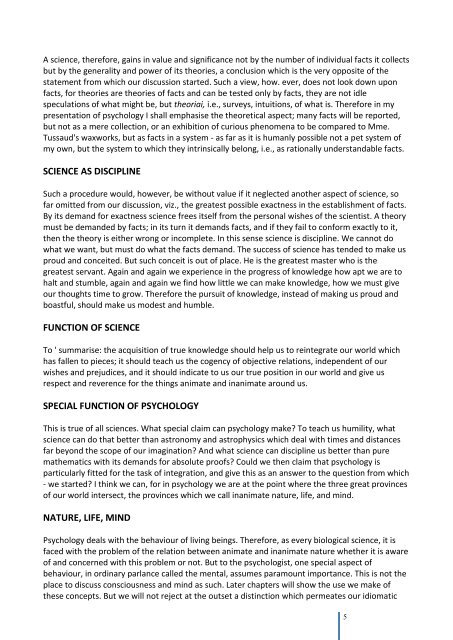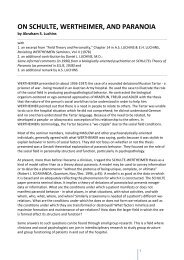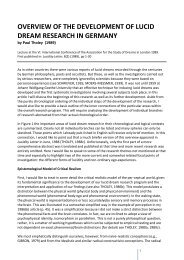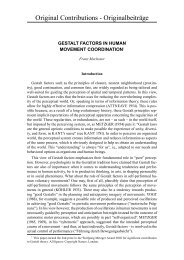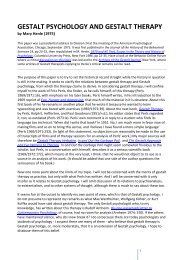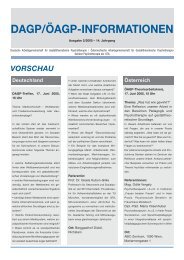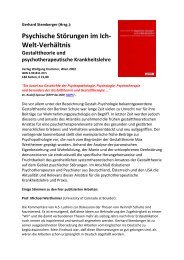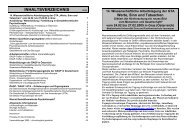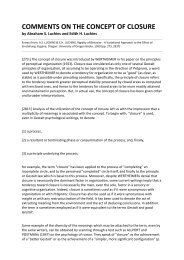Principles of Gestalt Psychology - Society for Gestalt Theory and its ...
Principles of Gestalt Psychology - Society for Gestalt Theory and its ...
Principles of Gestalt Psychology - Society for Gestalt Theory and its ...
You also want an ePaper? Increase the reach of your titles
YUMPU automatically turns print PDFs into web optimized ePapers that Google loves.
A science, there<strong>for</strong>e, gains in value <strong>and</strong> significance not by the number <strong>of</strong> individual facts it collectsbut by the generality <strong>and</strong> power <strong>of</strong> <strong>its</strong> theories, a conclusion which is the very opposite <strong>of</strong> thestatement from which our discussion started. Such a view, how. ever, does not look down uponfacts, <strong>for</strong> theories are theories <strong>of</strong> facts <strong>and</strong> can be tested only by facts, they are not idlespeculations <strong>of</strong> what might be, but theoriai, i.e., surveys, intuitions, <strong>of</strong> what is. There<strong>for</strong>e in mypresentation <strong>of</strong> psychology I shall emphasise the theoretical aspect; many facts will be reported,but not as a mere collection, or an exhibition <strong>of</strong> curious phenomena to be compared to Mme.Tussaud's waxworks, but as facts in a system - as far as it is humanly possible not a pet system <strong>of</strong>my own, but the system to which they intrinsically belong, i.e., as rationally underst<strong>and</strong>able facts.SCIENCE AS DISCIPLINESuch a procedure would, however, be without value if it neglected another aspect <strong>of</strong> science, s<strong>of</strong>ar omitted from our discussion, viz., the greatest possible exactness in the establishment <strong>of</strong> facts.By <strong>its</strong> dem<strong>and</strong> <strong>for</strong> exactness science frees <strong>its</strong>elf from the personal wishes <strong>of</strong> the scientist. A theorymust be dem<strong>and</strong>ed by facts; in <strong>its</strong> turn it dem<strong>and</strong>s facts, <strong>and</strong> if they fail to con<strong>for</strong>m exactly to it,then the theory is either wrong or incomplete. In this sense science is discipline. We cannot dowhat we want, but must do what the facts dem<strong>and</strong>. The success <strong>of</strong> science has tended to make usproud <strong>and</strong> conceited. But such conceit is out <strong>of</strong> place. He is the greatest master who is thegreatest servant. Again <strong>and</strong> again we experience in the progress <strong>of</strong> knowledge how apt we are tohalt <strong>and</strong> stumble, again <strong>and</strong> again we find how little we can make knowledge, how we must giveour thoughts time to grow. There<strong>for</strong>e the pursuit <strong>of</strong> knowledge, instead <strong>of</strong> making us proud <strong>and</strong>boastful, should make us modest <strong>and</strong> humble.FUNCTION OF SCIENCETo ' summarise: the acquisition <strong>of</strong> true knowledge should help us to reintegrate our world whichhas fallen to pieces; it should teach us the cogency <strong>of</strong> objective relations, independent <strong>of</strong> ourwishes <strong>and</strong> prejudices, <strong>and</strong> it should indicate to us our true position in our world <strong>and</strong> give usrespect <strong>and</strong> reverence <strong>for</strong> the things animate <strong>and</strong> inanimate around us.SPECIAL FUNCTION OF PSYCHOLOGYThis is true <strong>of</strong> all sciences. What special claim can psychology make? To teach us humility, whatscience can do that better than astronomy <strong>and</strong> astrophysics which deal with times <strong>and</strong> distancesfar beyond the scope <strong>of</strong> our imagination? And what science can discipline us better than puremathematics with <strong>its</strong> dem<strong>and</strong>s <strong>for</strong> absolute pro<strong>of</strong>s? Could we then claim that psychology isparticularly fitted <strong>for</strong> the task <strong>of</strong> integration, <strong>and</strong> give this as an answer to the question from which- we started? I think we can, <strong>for</strong> in psychology we are at the point where the three great provinces<strong>of</strong> our world intersect, the provinces which we call inanimate nature, life, <strong>and</strong> mind.NATURE, LIFE, MIND<strong>Psychology</strong> deals with the behaviour <strong>of</strong> living beings. There<strong>for</strong>e, as every biological science, it isfaced with the problem <strong>of</strong> the relation between animate <strong>and</strong> inanimate nature whether it is aware<strong>of</strong> <strong>and</strong> concerned with this problem or not. But to the psychologist, one special aspect <strong>of</strong>behaviour, in ordinary parlance called the mental, assumes paramount importance. This is not theplace to discuss consciousness <strong>and</strong> mind as such. Later chapters will show the use we make <strong>of</strong>these concepts. But we will not reject at the outset a distinction which permeates our idiomatic5


